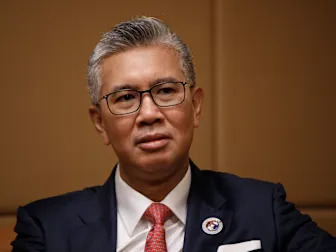(Bloomberg) -- The US reducing its proposed tariffs on Malaysia to a 10% baseline would be seen as a positive move, Investment, Trade and Industry Minister Zafrul Aziz said, conceding that a previously hoped for levy of zero may not be possible.
“To be fair, and the US has also been public about this, that the 10% is not negotiable — it seems to be the floor,” he said in an interview with Bloomberg TV on Tuesday on the sidelines of a regional summit in Kuala Lumpur.
“So for us, anything that can go below 24%, or at least 10%, the minimum” levy proposed by President Donald Trump last month “would be good for our industries and for our exporters,” he said.
Malaysia had previously been in talks with Washington on reducing the tariffs. In return, the Trump administration wants Malaysia to address trade imbalances, non-tariff barriers and safeguard US technology from being channeled to other parties and investments.
Southeast Asian countries would be among the hardest hit by Trump’s levies, with rates as high as 49%. Officials from several countries in the region are working on deals to avert the higher tariffs, which have been put on hold for 90 days. The US ran a goods trade deficit with Malaysia that hit $24.8 billion last year, according to data from the Office of the US Trade Representative.
Malaysian negotiators are set to return to the table next week, Zafrul said.
“What’s important for us is to try and come to a win-win solution,” he said, adding the US is Malaysia’s largest export market and its largest investor.
Southeast Asian leaders began two days of talks from Monday as they sought to deepen ties with China and Gulf nations and mitigate the fallout from any tariffs. Malaysia, for its part, launched negotiations for a free trade agreement with the Gulf Cooperation Council.
At the same time, Malaysia is imposing stricter rules to address the issue of possible transshipment of sensitive materials through its entry and exit points to countries barred from receiving the goods. The Investment, Trade and Industry Ministry announced this month that it will be the sole issuer of all non-preferential certificates of origin for shipment to the US effective May 6.
Trump officials this year pressured Malaysian authorities to crack down on what Washington said was semiconductor transshipment to China.
“The process so far has been quite smooth,” Zafrul said in the interview, adding the issue would not impact trade to Malaysia. “We have increased the capacity, resources to ensure that we do not have bottlenecks for the exporters to export to the US.”
--With assistance from Naman Tandon and Sabrina Mao.


